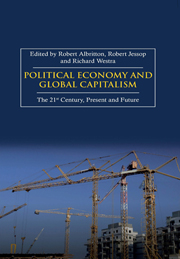Book contents
- Frontmatter
- Contents
- List of Abbreviations
- Notes on Contributors
- Introduction: Political Economy and Global Capitalism
- Part 1 Political Economy of the Present
- Introduction
- 1 Theorizing the Contemporary World: Robert Brenner, Giovanni Arrighi, David Harvey
- 2 Technological Dynamism and the Normative Justification of Global Capitalism
- 3 Eating the Future: Capitalism Out of Joint
- 4 What follows Neo-liberalism? The Deepening Contradictions of US Domination and the Struggle for a New Global Order
- 5 Monetary Policy in the Neo-liberal Transition: A Political Economy Critique of Keynesianism, Monetarism and Inflation Targeting
- Part 2 Political Economy of a Progressive Global Future
- Index
3 - Eating the Future: Capitalism Out of Joint
from Part 1 - Political Economy of the Present
Published online by Cambridge University Press: 05 March 2012
- Frontmatter
- Contents
- List of Abbreviations
- Notes on Contributors
- Introduction: Political Economy and Global Capitalism
- Part 1 Political Economy of the Present
- Introduction
- 1 Theorizing the Contemporary World: Robert Brenner, Giovanni Arrighi, David Harvey
- 2 Technological Dynamism and the Normative Justification of Global Capitalism
- 3 Eating the Future: Capitalism Out of Joint
- 4 What follows Neo-liberalism? The Deepening Contradictions of US Domination and the Struggle for a New Global Order
- 5 Monetary Policy in the Neo-liberal Transition: A Political Economy Critique of Keynesianism, Monetarism and Inflation Targeting
- Part 2 Political Economy of a Progressive Global Future
- Index
Summary
In this essay I want to utilize a particular interpretation of Marx's Capital to explore the extreme contradictions of the contemporary fast food system as it manifests in a particular sector (food) and in acute forms the general contradictions that Marx discussed in his brilliant three volume study of capital's inner logic. My approach features two levels of analysis proceeding from a theory of capital's deep structures to an analysis of some central features of the production and consumption of food in the US currently. The abstract level develops seven crucial themes extracted from capital's inner logic, and the historical level illustrates some ways in which these themes are played out in the current fast food sector of the increasingly globalized American economy.
Following the remarkable work of Japanese political economist Thomas Sekine, I have come to see that Marx's Capital can be reconstructed as a rigorous dialectical logic making it potentially the most powerful theory in modern social science. While the commodity-form never rules us completely, in developed capitalist societies, it does so to such an extent that it is possible to complete its rule in theory. By doing this we convert social power relations into economic structures that can be theorized as forming necessary inner connections that interrelate through quantities (essentially price signals) that are manifested in markets.
- Type
- Chapter
- Information
- Political Economy and Global CapitalismThe 21st Century, Present and Future, pp. 43 - 66Publisher: Anthem PressPrint publication year: 2007
- 2
- Cited by

